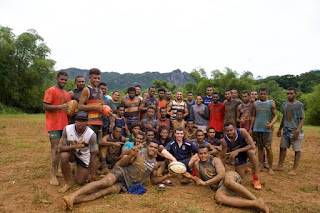Growing up in a Christian family, Vika chose to make Jesus the Lord of her life at 12 years of age, then at age 19, she joined Youth With A Mission (YWAM) attending a Discipleship Training School (DTS), in Vunyasi, Nadi in September 1990. The school made a big impact, transforming her into a different person. There, she received teaching about how to hear God’s voice and she applied it to her life. After seeking God, she knew she was to become a missionary.
After the completion of her DTS, she felt strongly to go and share with her parents that God was calling her to be a missionary. This was hard for her father because his expectation had been for her to find work and help the family. She left the house knowing that she had done her part and needed to trust God for her parents’ response.One month later, she went back home again for a weekend and as the family held an evening devotion, her dad intimated he had something very important to tell her about her desire to be a missionary. With tears in his eyes, he explained that when she had shared that God was calling her to be a missionary, both he and her mother were very scared of losing her. But as they prayed about it, God reminded them about how they had dedicated her as a baby. They had actually said to the pastor that they wanted to give this child to be used by God. Now 19 years later, she would become that missionary. Her parents now understood it was God’s doing and they wanted to obey Him, so they blessed her decision. Whenever Vika wanted to quit because of hardships or trials, the words of her parents gave her the strength to carry on knowing they believed in her. They supported her with prayer and finances whenever they could.
Initially, Vika had fought the idea to be a missionary because of her distorted view of church life. As an extrovert, she thought being a missionary would be boring. Only after she came to YWAM and was introduced to a personal relationship with Jesus, were her eyes and heart opened. She asked God to take her to the nations.
Vika joined YWAM as staff in April 1990 and served the base for ten years, working with children in a YWAM ministry called Kings Kids International (KKI). She then left for the YWAM base in Honolulu, Hawaii, as the Kings Kids Director. She went on to attend a School of Missions and Evangelism (S.O.M.E), then staffed DTS’s. She also served in many practical areas of the base, including cooking duties.
After five years on staff in Honolulu, Vika journeyed to Pune, India to do Islamic Studies as she believed God was leading her to the Arabic Nations. Following her studies, she did an eight-month internship in Egypt before returning to Fiji.
Through YWAM, Vika has had the privilege of serving short-term in many nations, being enriched by the many people she served and encountered: Indians, Arabs, Thais, Chinese and other Pacific Islanders. It taught her to love the lost, realizing that’s what moves God’s heart.
Something God highlighted to Vika at one point in her life was the racial prejudice in her heart toward the Indians in Fiji (Indo-Fijians) and, even though Fijians and Indians attended the same schools and enjoyed one another’s foods, she felt the need to repent of that prejudice. She asked God to give her the love for those Indo-Fijians and to share the gospel with them. She learned that choosing to love those you don’t think you can love by praying for them became God’s way to give her his heart for them. God moulded her, changing her worldview about people and showing her how she could reach out through her Indian Evangelism Ministry in Fiji.
Coming to YWAM gave Vika a heart for the lost as she served him. In addition, God then brought a godly man into her life who also had a heart for the lost. On November 17, 2007, Vika married Ledua Seruvatu. Ledua was born in Mabula Cicia, Lau. His father’s name is Cama Sunia and his mother’s name is Wati. Ledua has seven brothers and one sister.Ledua and Vika have two children, Jeremaia Richard Seruvatu born 10, July 2009 and a daughter, Sofaia Augusta Ofakivaha Seruvatu born, on 21st Dec. 2010. Ledua used to work in a construction company called Fletcher where he did landscaping and built swimming pools for hotels before he came to do a Discipleship Training School (DTS). He is currently an ordained minister in the Assemblies Of God church in Fiji. Ledua and Vika currently serve at an Assemblies of God church as associate Pastors, but work full time in Youth With A Mission.
Ledua now leads the DTS Training school, where he is passionate about raising young Fijians for the Lord and reaching the lost. His main gifts are evangelism/ apostle and prophetic as well. Vika now leads the School Of Frontier Missions (SOFM) with a heart to multiply more Fijians going out and reaching the unreached. Her main passion is in teaching, exhorting, hospitality and intercessory prayer. For a while, they both served at the Personal Transformation Center in Lautoka before they were prayed over to come back to Vunyasi and lead the base where they are today.Their heart for the future is to go to Turkey and work long term among their neighbours. Vika came to YWAM a long time ago and now with her husband is still in YWAM and believes they will continue in the mission for a very long time.





















 .
. 







